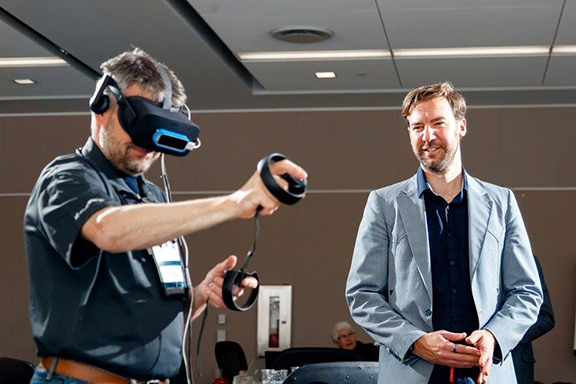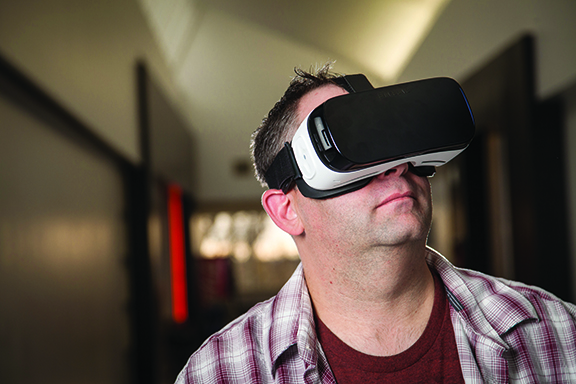Lethbridge College is now a member of VR/AR Association (VRARA), a global organization connecting industries, educators and brands in advancing virtual and augmented reality.
And, as the credit card slogan says, membership has its privileges — for the entire college community.

Kris Hodgson, interim chair of the School of Media and Design, is shown at the Cybera Conference where he led a session on virtual reality.
Kris Hodgson, interim chair of the School of Media and Design, says all Lethbridge College students, faculty and staff will have access to the association’s resources, including reports, research, white papers and case studies.
Beyond connecting to VRARA’s 3,900 member organizations and 16,000 professionals internationally, the association will have a presence locally. Hodgson and multimedia instructor Mike McCready will serve on the board of the Alberta Chapter of VRARA and will be co-presidents of a Lethbridge satellite of the chapter, creating more opportunities for individuals, businesses and groups to explore VR and AR.
“We’ll be able to consolidate what’s already happening in Lethbridge with VR through networking and building up the sector,” Hodgson says.
Lethbridge is already home to several VR content creators, businesses like virtual reality arcades and Economic Development Lethbridge’s tecConnect centre, a tech business incubator.
Hodgson says you don’t have to be a student in the college’s School of Media and Design to be involved in VR. He suspects students across the campus, exposed to virtual or augmented reality, will have ideas for using this technology in their own areas of study and career pursuits.

The applications are as limitless as your imagination, he says. VR can provide an otherworldly gaming environment, or a realistic, but safe, training space. At Lethbridge College, for example, VR gives potential students a sense of what it’s like to work atop a wind turbine. Or, VR can take students on a field trip to another country, without ever leaving campus. The space might be virtual, but the connections are real, Hodgson says.
“Through this kind of storytelling, we can explore human rights issues and build empathy,” he says, of one exciting aspect of VR.
Membership will support Lethbridge College’s cutting-edge work in creating VR content, led by faculty and students in the School of Media and Design. Joining VRARA also signifies Lethbridge College’s leadership in a VR sector that shows no signs of slowing, Hodgson says.
According to a Digi-Capital economic forecast, virtual reality and augmented reality will be a $108-billion market by 2021.
Virtual reality is the use of computer technology to create a simulated environment. Through a special VR viewer, the user can move through and interact with the environment, as if physically there. Augmented reality provides an enhanced version of the physical space the user is in. Through an app on your phone, for example, you can view additional layers of information about the space in front of you.
Lethbridge College and the VRARA will host Merging Realities: An event of multiple perspectives on April 26, the first conference held completely in virtual reality. Online registrations are now open.